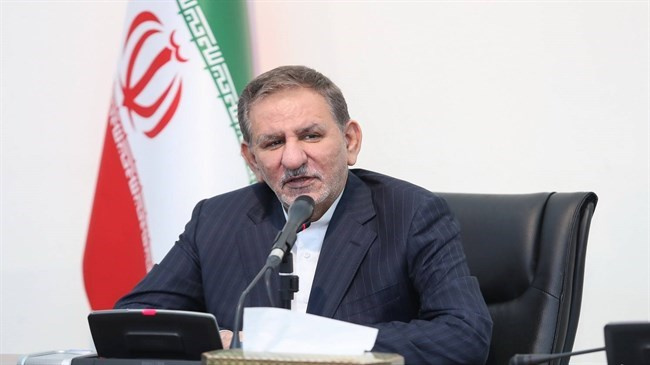Iran: New agreement with IAEA sign of Tehran’s goodwill to world on nuclear issue

Political Desk
Iran’s First Vice-President Es'haq Jahangiri said on Monday that Tehran has demonstrated its goodwill in dealing with peaceful nuclear usage by signing a new agreement on continuation of cooperation with the United Nations nuclear watchdog.
Jahangiri wrote in a tweet that the agreement made on Sunday between Iran and the International Atomic Energy Agency (IAEA) has been reached within the framework of law and the Iranian interests, IRNA reported.
Any access beyond the safeguards was prohibited, he said.
The art of authoritative diplomacy also includes removing blockage, he said, adding that the enemy is seeking to intensify the situation for Iran.
The agreement was signed between Head of the Atomic Energy Organization of Iran (AEOI) Ali Akbar Salehi and Director-General of the International Atomic Energy Agency (IAEA) Rafael Grossi during his visit to Iran.
Based on the document, the two sides have agreed on the continuation of the “essential activities” of the IAEA inspectors in Iran for up to three months within the Safeguards Agreement.
Commenting on the agreement, Iran’s Foreign Ministry spokesman said Tehran’s voluntary implementation of the Additional Protocol will be suspended while some of the necessary verification and monitoring activities of the International Atomic Energy Agency will continue for up to three months within the Safeguards Agreement, Press TV reported.
Based on the new agreement, Iran will refuse to share footage from cameras at its nuclear sites with the IAEA.
However, Leader of the Islamic Revolution Ayatollah Seyyed Ali Khamenei said later on Monday that Iran may enrich uranium up to 60% purity if needed.
Ayatollah Khamenei added Tehran will not back down on its right to peaceful nuclear technology and will continue its progress in this field in line with the country’s present and future needs.
Ayatollah Khamenei also emphasized that Iran will resume the full implementation of the 2015 nuclear deal, officially known as the Joint Comprehensive Plan of Action JCPOA, if other parties fully abide by the agreement.
JCPOA was signed between Tehran and six major world states — the US, France, Britain, Germany, China and Russia — and was later endorsed by UN Security Council Resolution 2231.
However, the US under Trump unilaterally pulled out of the JCPOA in May 2018 and reinstated the anti-Iran sanctions that had been lifted by the deal.
Trump’s administration also launched a push to fully destroy the agreement by trying to dissuade the remaining signatories from staying in the agreement and threatening sanctions against any party that refuses to cut business ties with Tehran in defiance of American sanctions.
Washington’s pressure successfully blocked the European co-signatories from fulfilling their contractual obligations, a situation that prompted Tehran to retaliate and suspend parts of its own commitments under Article 36 of the JCPOA.
Back in December, Iranian legislators passed a law to further accelerate the development of the nuclear program. The law is a firm reaction to Washington’s withdrawal from the Iran nuclear deal and the illegal sanctions the US has imposed against Iran since then.
Among other things, the law tasked the Iranian administration to stop allowing inspections beyond the Safeguards Agreement, including the voluntary implementation of the Additional Protocol, if the other parties to the JCPOA failed to deliver on their commitments.
Source: Iran Daily

